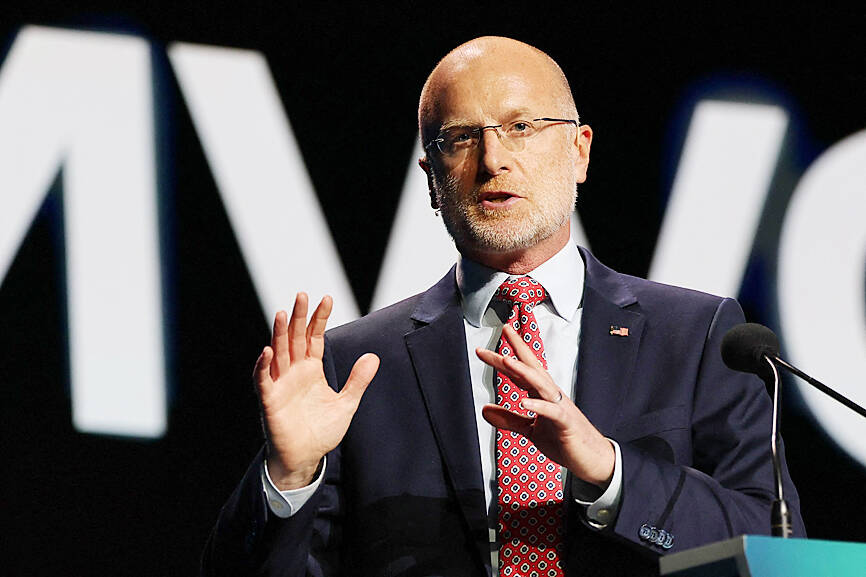The US Federal Communications Commission (FCC) on Friday said it is investigating nine Chinese companies including Huawei Technologies Co (華為), ZTE Corp (中興通訊), Hangzhou Hikvision Digital Technology Co (杭州海康威視數字技術), China Mobile Ltd (中國移動) and China Telecom Corp (中國電信) to determine if they are seeking to evade US restrictions.
The Chinese companies have all been placed on the FCC’s “Covered List” that deems specific communications equipment and services pose a threat to US national security.
The companies may be still operating in the US, because they do not believe the designation prohibits particular types of operations, FCC Chair Brendan Carr said.

Photo: AFP
Other companies under investigation include Hytera Communications Corp (海能達通訊), Dahua Technology Co (大華技術), Pacifica Networks/ComNet (信通電話) and China Unicom (Americas) Operation Ltd.
It is the latest in a series of actions against Chinese telecom and technology firms by Washington. The FCC previously barred the Chinese companies from providing telecommunications services in the US, citing national security concerns.
The FCC has reason to believe the Chinese firms on the list “are trying to make an end run around those FCC prohibitions by continuing to do business in America on a private or ‘unregulated’ basis,” Carr said.
The FCC “will identify the scope of their ongoing activities and move quickly to close any loopholes that have permitted untrustworthy, foreign adversary state-backed actors to skirt our rules,” he said.
The FCC’s investigation is seeking detailed information about ongoing US businesses and information about other companies that might be aiding US operations.
The FCC said it sent letters of inquiry and at least one subpoena to the companies.
It last year advanced efforts to step up security of the Border Gateway Protocol, which is central to the Internet’s global information routing system.

UNCERTAINTY: Innolux activated a stringent supply chain management mechanism, as it did during the COVID-19 pandemic, to ensure optimal inventory levels for customers Flat-panel display makers AUO Corp (友達) and Innolux Corp (群創) yesterday said that about 12 to 20 percent of their display business is at risk of potential US tariffs and that they would relocate production or shipment destinations to mitigate the levies’ effects. US tariffs would have a direct impact of US$200 million on AUO’s revenue, company chairman Paul Peng (彭雙浪) told reporters on the sidelines of the Touch Taiwan trade show in Taipei yesterday. That would make up about 12 percent of the company’s overall revenue. To cope with the tariff uncertainty, AUO plans to allocate its production to manufacturing facilities in

TAKING STOCK: A Taiwanese cookware firm in Vietnam urged customers to assess inventory or place orders early so shipments can reach the US while tariffs are paused Taiwanese businesses in Vietnam are exploring alternatives after the White House imposed a 46 percent import duty on Vietnamese goods, following US President Donald Trump’s announcement of “reciprocal” tariffs on the US’ trading partners. Lo Shih-liang (羅世良), chairman of Brico Industry Co (裕茂工業), a Taiwanese company that manufactures cast iron cookware and stove components in Vietnam, said that more than 40 percent of his business was tied to the US market, describing the constant US policy shifts as an emotional roller coaster. “I work during the day and stay up all night watching the news. I’ve been following US news until 3am

COLLABORATION: Given Taiwan’s key position in global supply chains, the US firm is discussing strategies with local partners and clients to deal with global uncertainties Advanced Micro Devices Inc (AMD) yesterday said it is meeting with local ecosystem partners, including Taiwan Semiconductor Manufacturing Co (TSMC, 台積電), to discuss strategies, including long-term manufacturing, to navigate uncertainties such as US tariffs, as Taiwan occupies an important position in global supply chains. AMD chief executive officer Lisa Su (蘇姿丰) told reporters that Taiwan is an important part of the chip designer’s ecosystem and she is discussing with partners and customers in Taiwan to forge strong collaborations on different areas during this critical period. AMD has just become the first artificial-intelligence (AI) server chip customer of TSMC to utilize its advanced

Six years ago, LVMH’s billionaire CEO Bernard Arnault and US President Donald Trump cut the blue ribbon on a factory in rural Texas that would make designer handbags for Louis Vuitton, one of the world’s best-known luxury brands. However, since the high-profile opening, the factory has faced a host of problems limiting production, 11 former Louis Vuitton employees said. The site has consistently ranked among the worst-performing for Louis Vuitton globally, “significantly” underperforming other facilities, said three former Louis Vuitton workers and a senior industry source, who cited internal rankings shared with staff. The plant’s problems — which have not